- Home
- MariaLisa deMora
The Gray Zone
The Gray Zone Read online
The
Gray
Zone
If you could change one thing: A Tangled Fates Story
MariaLisa deMora
Edited by Hot Tree Editing
Proofreading by Whiskey Jack Editing
Photography by 6:12 Photography by Eric McKinney
Copyright © 2019 MariaLisa deMora
All rights reserved. This book or any portion thereof may not be reproduced or used in any manner whatsoever without the express written permission of the publisher except for the use of brief quotations in a book review. This is a work of fiction. Names, characters, places and incidents are either the product of the author's imagination, or are used in a fictitious manner. Any resemblance to actual persons, living or dead, or actual events is entirely coincidental.
First Published 2019
ISBN 13: 978-1-946738-36-3
DEDICATION
Thank you to my family for all the support.
Contents
So sorry
Current situation
Did I do this
Just a question
It’s a blessing
Where to begin
Permanent destination
ACKNOWLEDGMENTS
The gray zone is a term demarking a space where unexpected things happen. Where events happen just below the threshold of what would provoke a response.
Inexplicable things happen to thousands of people per day, and embedded within is the knowledge that disaster is only one small decision away. What if a specific precipitating event was known, and it could be altered, but doing so created a cascade of terrible experiences? Can a body recover from taking matters into their own hands, and give control back to the unmeasured expanse from where it came?
Many, many thanks to Hot Tree Editing and Whiskey Jack Editing for your assistance in polishing my words. You folks make me look good.
Is “I want” a good enough reason for anything?
Woofully yours,
~ML
The Gray Zone
The gray zone is where unconventional actions come into play.
When all options are unthinkable, how do you get past that and into the real decisions that matter? Could you balance hope and selflessness to achieve greater good? Or would you give as good as you got, wrestling things into line with your desires?
Could you handle the crippling consequences of your actions?
“I want her back.” If you could change everything with a word … would you?
So sorry
“I’m so sorry for your loss.”
If Clive heard those words one more time, he thought he might lose his mind. The phrase people used when they didn’t know what else to say.
He understood the need of the people around him to try to convey their sympathy, but after a thousand iterations of the same saying, he wasn’t sure he would ever be able to trust the truth behind the words. It was like repeating a single phrase until it didn’t sound real anymore, until it turned into simple sounds that didn’t make any sense. Or writing out something mundane, and inside his head, the part that recognized the phrase as language tweaked sideways. In an instant, what he’d written wouldn’t look like a word at all, just scribbles on a paper. That’s how the phrase felt inside his head now, scribbles against his eardrums that left an uneasy resonance behind.
At least the nightmare was almost over. Another hour at most. He’d made it through. The process had gone on forever. First, the crowded viewing that lasted ages too long, then the solemnity of the funeral that flashed past in a blur of standing and sitting, and then the finality of the graveside, with a yawning hole dark under the casket. The idea of that darkness, that cold embrace of the earth, had nearly unrooted his control, but he’d clung to it with a tenacious hold.
All of that, and he still wasn’t done, but they were about halfway through the family meal back at the local community center. Organized by the ladies from his sister’s church, the meal was meant to give the family a chance to relax in quiet without having to be alone.
The problem was, he would always be alone now.
He and Claire had been inseparable their whole lives. Fraternal twins, their close bond had built in the womb and never wavered. From the cradle and into childhood, then through school and college, they’d always been best friends. Clive and Claire had taken the same classes, lived in the same dorm, run with the same friends, and constructed lives that ensured they could be near each other. Even when she’d met Dennis, the love of her life and a man Clive had given his wholehearted approval of, she and her little family had moved only blocks away.
When she’d tearfully joked it was too far for their morning coffee, he’d proven her wrong, and Dennis had laughed at the relief in her face the first day Clive had come through the back door. Her marriage had given her a sense of purpose and love, and she’d shone with it. When she and Dennis had a son, Micah, Clive had doted on him. The boy could do no wrong in his eyes, and he’d been the best damn uncle anyone could have wanted. And when she’d suddenly lost her husband and son, it had been a blessing that they’d remained so close.
“Clive.” Claire’s voice on the phone wavered, sounding as if she were underwater. “Can you come over? Can you come home?”
“What?” He’d plugged his other ear, straining to hear her over the racket of the machines in the plant. “What is it, Claire?”
“They’re gone.” Silence followed those words, out of place and foreign. He pulled the phone away and checked to verify the call hadn’t dropped, missing her next words. “…so fast. They said there was nothing they could do. No way to warn them.”
“What’s happened? Say that again.”
“Dennis. Dennis and Micah. They’re gone, Clive.”
A dam had burst upstream from where their group was camping, a pleasant vista along the banks of a slow-moving river. Three adults and eleven children had died, bodies battered against the debris the wall of water carried with it. An act of God, the authorities called it, as if that made things easier to accept.
After the accident, Claire had been drifting through her house like a solitary ghost, moving from room to room, touching things, adjusting pictures on the walls, nearly vanishing in her grief. Clive had given her a couple of weeks, then packed a bag. While him moving in was originally intended to be short-term, they’d quickly fallen into the smooth routine they’d always shared. It hadn’t been a surprise to anyone when Clive put his place on the market a few months later. He hadn’t wanted her to leave the place where she’d built so many happy memories, but she needed someone. So he stayed there, blending their lives together enough that she began to create new ones.
That was what they’d always done for each other, just be there, present. Always.
And now she was gone.
The wreck that had killed her was horrific. A drunk driver—traveling more than forty miles per hour over the speed limit—blasted into her car from behind. They’d careened sideways into nearby bridge columns, and the drunk’s car had immediately caught fire. A voracious, fuel-fed fire that spread.
Clive pushed away the pictures he’d seen of Claire’s vehicle, charred and twisted beyond recognition, a tarp covering the windshield to keep passersby from seeing her body.
He picked up the plastic fork and pushed a meatball in a wavering trail across his plate as he looked around.
The room wasn’t anywhere near filled, only three tables occupied. Him, seated closest to the door, alone. Two older cousins from their father’s side of the family at another table, two grandchildren they’d unwisely brought with them running madly up the aisles between rows of chairs. The church ladies at the third, heads bent together so they could talk and gossip quietly.
How long before I can gracefully leave?
He created a path for the meatball through the corn, driving it along that tiny road without thinking about anything more than what it would take to get him out of here.
The outside door opened, and Claire’s pastor, Jacob Rudolph, came inside with a stomp of his feet and a shake of his coat. Through the opening behind the man, he could see the day had turned gloomy, and Clive wondered about a glow he saw in the distance. Then the closing door cut off his view, and he turned back to his plate, seeing his meatball had now traveled through the green bean casserole.
“May I?”
Clive looked up at the question, surprised to find the pastor standing nearby. He nodded slowly.
Rudolph settled into the chair opposite him, movements fussy and annoyingly pretentious.
Religion was the only thing he and Claire had ever really disagreed on. Clive prided himself on being pragmatic, believing in something but unconvinced that organized religion would move him any further along the path of understanding. In his mind, Sunday mornings were better spent in nature and communing with the world around him than sitting on a padded bench listening to some man talk about a God only seen in his mind, suffering through those attempts to convey a flawed image to the ones around him. Claire had been the opposite, and every Sunday morning he happened to still be home as she prepared for church, Clive had gotten an earful. She loved him, and he loved her, but through the years, that topic had strained their relationship more than anything else.
“It’s a blessing, if you look at what might have happened.”
Clive looked up, nonplussed at the words, the first the man had uttered since seating himself.
With an impatient look on his face, Rudolph continued, “Considering what she was facing.”
The man had alluded to something similar in his message during the funeral, and Clive had dismissed it as an attempt to be comforting. This sounded more personal. “What?”
“They said it was instant, right? She passed in a moment, no pain, no fear, just gone on to meet her Holy Father.”
The unwelcome image of Claire’s car swam back up in Clive’s mind. Crumpled and misshapen, the rear axle completely exposed because the body of the car had been shorn away. Wrapped in a “C” shape around a concrete column. Blackened instead of the light gray he’d known the vehicle to be. Bright blue tarp at odds with the apocalypse that the car had become, covering the destruction of the windshield and driver window. Her poor body so mangled the funeral director had tried to discourage Clive from seeing her.
But he’d had to. Clive had needed to see, to be a witness to the end of his other half. His mind kept picking at the idea that it could have been anybody in that room, in that cold slot behind that steel door, lying on that metal bed. Logically, he knew the authorities hadn’t lied, hadn’t made a mistake, hadn’t misidentified Claire. But in the back of his brain, a tiny grain of denial had stuck.
So he’d made his case, trying to be practical about his request. In plain words, he’d asked for closure and used all the logical arguments he thought a person would in that situation. Shooed from the room while they prepared the body, the somberly spoken words of the funeral director had struck a moment of fear into Clive.
When he’d stepped back inside, all he could see was a sheet-draped lump that vaguely resembled a person, but topping that was Claire’s hair. As he edged closer, he’d seen that the fire hadn’t damaged her entirely, leaving her face and hair relatively untouched. The crash had crumpled her skull, a collapsed indent showing where the door post had impacted her head. Misshapen or not, he couldn’t deny it had been Claire’s face. No matter what, he could have recognized her anywhere.
“Yeah. She went fast.” He supposed that was a blessing, if one could call it that. Oh sure, she died, but at least she went fast. Clive shook his head. “They said she couldn’t have seen it coming.” Traffic in front of her had slowed, and Claire, being the safe driver she was, had left ample cushion between her and the vehicle ahead of her. When the drunk slammed into her, their crumpled vehicles had slid around all the other cars like conjoined twins, so it was only the two automobiles involved. A cop interviewed for the local paper said he’d never seen anything like it. “A miracle there were no more fatalities.”
A miracle. But Claire was still dead.
The preacher shifted in his seat, leaning forwards to rest both elbows on the table. “Clive, you knew, right?”
“Knew what?” He abandoned his fork, leaving the meatball mired in the mashed potatoes, congealing gravy bogging it down.
“About Claire.”
Jesus, get to the point. “I’m sorry, I don’t understand what you’re asking.”
“About what was going on with Claire.”
I’m not up for any long discussion today, sorry. My sister’s dead. Things he could think but would never say, knowing how much respect Claire had for the man. “Reverend, if you could explain, please?”
“Knowing what she was facing in the near future, it’s almost a blessing she went without pain.” Rudolph adopted a condescending tone, and Clive found himself bristling at the man. “God works in mysterious ways.”
“You’re saying it’s a good thing my sister’s dead?” He closed his eyes tight for a moment. “That Claire is gone? She was only forty-two years old, and she’s dead.”
“Well, with the pain she was already in, we can be grateful that at least she’s not suffering anymore.”
He stared at the man and tried to get a handle on the intent. He hadn’t been to too many funerals in his life, but at the ones he’d attended as a grieving survivor—his parents, his brother-in-law, and nephew—there had been no attempts to console through some kind of sick application of “comparatively speaking” arguments. Is he implying she was still deeper in grief than I thought? It had been a decade since the accident took Dennis and Micah from her, but especially in the past handful of years, she’d seemed to be healing. Time added a layer of cushioning over the loss that made it less acute but still there, still crippling if the blessed balance of distance was scraped away, but when left undisturbed, that buffer made it so a person could function without being overwhelmed.
“Rudolph, you’re going to have to be plain. It’s been a trying few days, and I’m not following you at all.” He paused and considered, then added a brusque “please” as good form.
Looking at Clive as if he’d lost his mind, the preacher’s mouth opened, shut, and then opened again. He leaned closer and lowered his voice as he said, “She told me the cancer had already spread to her bones, and she was in considerable pain. She asked me to pray for her, for God’s grace to get through the upcoming ordeal, because it was only going to get worse.” Liar. Clive stared as Rudolph’s head tilted the other direction. “So knowing that death was looming, and that she would suffer greatly through her transition to the other world, it is surely a grace that God chose to take her in this way. Swiftly, without fear or pain.”
Clive counted his breaths, holding each intake for four seconds, then slowly breathing out for eight. A trick he’d learned in his job, helping keep his calm in boardroom meetings where hotter heads were the norm. When he did this, all he could hear was the rush of air through his nose. In, then out. Still not enough. His mind protested the idea that Claire would have kept something so profound from him.
He closed his eyes, deeply focused on his breathing, in, then out, until it was all that existed. There was a buzz and thrum of static electricity, and immediately the throbbing behind his eyes worsened, causing him to lose focus. That was all it took to bring him out of the dark, silent world and back into this chaotic one that no longer made sense.
“What do you mean, Claire had cancer?” She would have told him if she had. He would have noticed her going to doctor visits, for treatments. For God’s sake, she still had all her hair. The vision of that undamaged piece of her struck him again, like a blow. Sheet pulled to her chin to hide the harm done to
her body, but just the way the fabric had draped had told so much of the story. “She wasn’t sick.”
“She hadn’t told you? Oh, Clive. I’m so sorry.”
… for your loss, his brain supplied in a stuttering beat, swamping his senses with a memory of smell from the preparation room at the funeral home. He swallowed hard, forcing the muscles of his throat to lock down the need to vomit.
Unaware, the preacher continued, his voice dropping low in a semblance of privacy. “She came to me two weeks ago and said she’d just been diagnosed.”
“Two weeks?” His voice sounded strangled, and he cleared his throat. “That long?” Two weeks ago he’d still been in Chihuahua at a plant that was struggling, maneuvering around the local laws to get the workers to fall in line with the necessary changes. After coming home because of the accident, he was supposed to be back down there next week, but he hadn’t committed to the trip yet. Following Claire’s death, there would be so many details to tend to, and he wanted to give them his full attention, because Claire deserved no less. “That’s absurd.” And you’re a liar. “She would have told me. I would have seen.”
He pushed back from the table and stood, leaving that lone meatball where it was. “I’m not saying you’re lying, but for someone who makes it his business to console people, you should know your delivery leaves a lot to be desired.” He nodded stiffly at the cousins he hadn’t seen for years, and probably wouldn’t see again, then offered the church ladies a brief wave. Coat in hand, he turned to the door.
“She had her reasons not to tell you, Clive.”
The voice had come directly next to his ear, and he whirled, surprised to find the preacher still standing beside his chair, half a room away. “You don’t know me. You don’t know a thing about me.” The man reared back, looking shocked at the raw anger in Clive’s voice. “So don’t pretend to be friendly for the sake of fulfilling whatever sick satisfaction you get out of hurting people. You don’t know me.” He turned and exited the building, barely able to resist the desire to slam his way out, closing the door with carefully moderated strength instead.

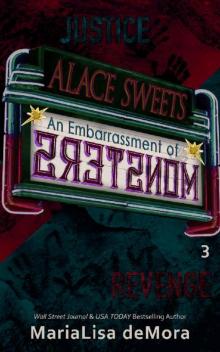 An Embarrassment of Monsters: A Dark Romantic Suspense Novel (Alace Sweets Book 3)
An Embarrassment of Monsters: A Dark Romantic Suspense Novel (Alace Sweets Book 3) Seeking Worthy Pursuits: A Dark Romantic Suspense Novel (Alace Sweets Book 2)
Seeking Worthy Pursuits: A Dark Romantic Suspense Novel (Alace Sweets Book 2) The Gray Zone
The Gray Zone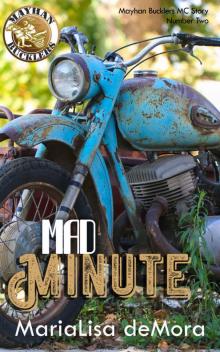 Mad Minute
Mad Minute Bet on Us
Bet on Us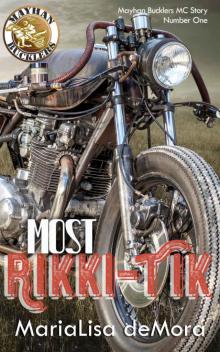 Most Rikki-Tik
Most Rikki-Tik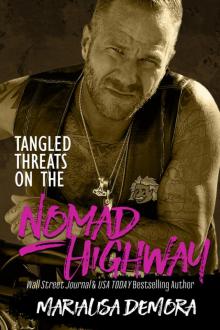 Tangled Threats on the Nomad Highway
Tangled Threats on the Nomad Highway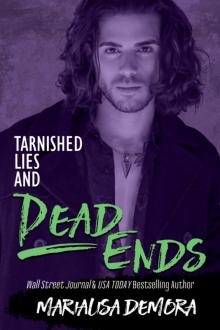 Tarnished Lies and Dead Ends
Tarnished Lies and Dead Ends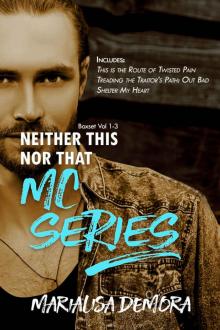 Neither This Nor That Box Set 1
Neither This Nor That Box Set 1 See You in Valhalla
See You in Valhalla No Man's Land: A Rebel Wayfarers MC & Incoherent MC Crossover Novel
No Man's Land: A Rebel Wayfarers MC & Incoherent MC Crossover Novel Service and Sacrifice
Service and Sacrifice Rebel Wayfarers MC Boxset 3
Rebel Wayfarers MC Boxset 3 Rebel Wayfarers MC Boxset 4
Rebel Wayfarers MC Boxset 4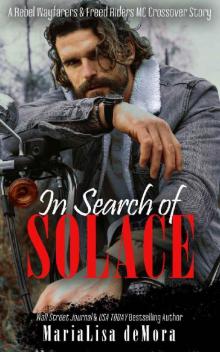 In Search of Solace (Rebel Wayfarers MC)
In Search of Solace (Rebel Wayfarers MC)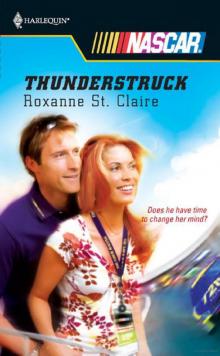 Thunderstruck
Thunderstruck Gunny's Pups: #10.25 (Rebel Wayfarers MC)
Gunny's Pups: #10.25 (Rebel Wayfarers MC) Christmas Doings
Christmas Doings Gypsy's Lady
Gypsy's Lady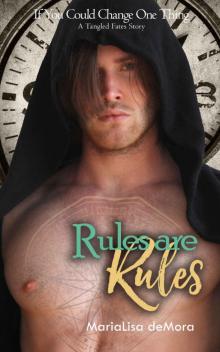 Rules Are Rules
Rules Are Rules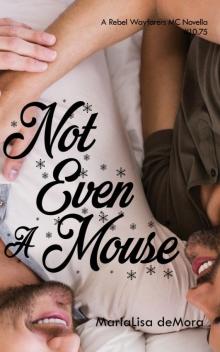 Not Even A Mouse
Not Even A Mouse Secret Santa
Secret Santa Duck (Rebel Wayfarers MC Book 8)
Duck (Rebel Wayfarers MC Book 8)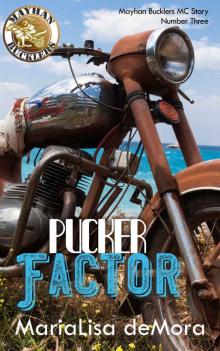 Pucker Factor
Pucker Factor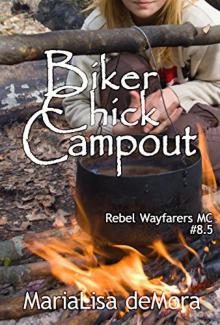 Biker Chick Campout (Rebel Wayfarers MC)
Biker Chick Campout (Rebel Wayfarers MC)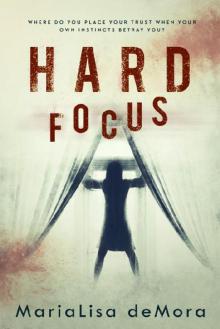 Hard Focus
Hard Focus Slate (Rebel Wayfarers MC)
Slate (Rebel Wayfarers MC)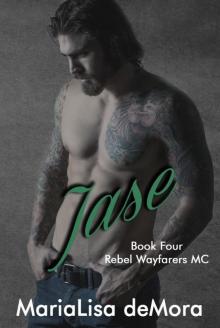 Jase
Jase There Are Limits
There Are Limits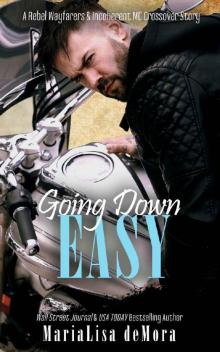 Going Down Easy: A Rebel Wayfarers MC & Incoherent MC Crossover Novel
Going Down Easy: A Rebel Wayfarers MC & Incoherent MC Crossover Novel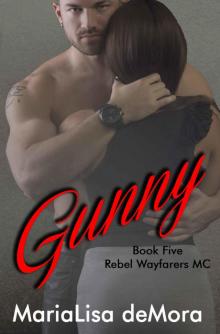 Gunny (Rebel Wayfarers MC Book 5)
Gunny (Rebel Wayfarers MC Book 5) Biker Chicks: Volume 2
Biker Chicks: Volume 2 A Sweet & Merry Christmas
A Sweet & Merry Christmas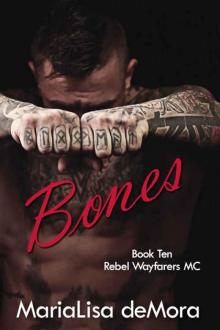 Bones (Rebel Wayfarers MC Book 10)
Bones (Rebel Wayfarers MC Book 10) Born Into Trouble (Occupy Yourself Book 1)
Born Into Trouble (Occupy Yourself Book 1) With My Whole Heart
With My Whole Heart Harddrive Holidays
Harddrive Holidays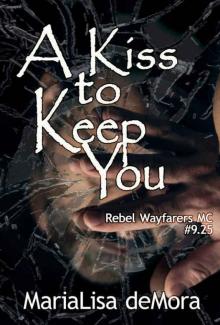 A Kiss to Keep You (Rebel Wayfarers MC Book 14)
A Kiss to Keep You (Rebel Wayfarers MC Book 14)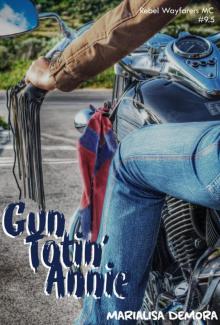 Gun Totin' Annie
Gun Totin' Annie Hoss (Rebel Wayfarers MC Book 7)
Hoss (Rebel Wayfarers MC Book 7) Mica (Rebel Wayfarers MC)
Mica (Rebel Wayfarers MC)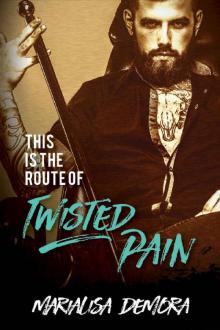 This Is The Route Of Twisted Pain (Neither This, Nor That Book 1)
This Is The Route Of Twisted Pain (Neither This, Nor That Book 1) Fury (Rebel Wayfarers MC Book 11)
Fury (Rebel Wayfarers MC Book 11) Watcher
Watcher